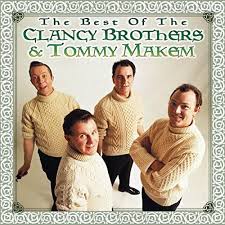
Immigration to the United States and other countries from Ireland is one theme throughout Ireland’s rich tradition of song and music since the late 19th Century.
Only a few of these songs are typically sung in Irish pubs and restaurants here in the United States. Among them is The Wild Colonial Boy, which was made popular by Tommy Makem and the Clancy Brothers. It’s the story of a young man who emigrates to Australia, becomes a criminal who robs the rich, and dies in a shootout. It’s hardly the typical immigrant experience.
Many of these songs are more sentimental, such as the ballad by Thomas Patrick Keenan titled “A Mother’s Love’s a Blessing” about a young man embracing his mother as he is about to board a ship.
The lyrics include, “She threw her arms around his neck and this to him did say: A mother’s love is a blessing, no matter where you roam. Keep her while she’s living, you’ll miss her when she’s gone. Love her as in childhood, though feeble, old and grey, for you’ll never miss your mother’s love ’til she’s buried beneath the clay.”
I was reminded of that song at the Virginia State AOH convention over the summer, when many who attended told me they were unfamiliar with another by the same songwriter when it was played by a DJ.
That song is called “Hello Patsy Fagan.” It’s a catchy tune written at the turn of the 20th century in Ireland and recorded in New York City in the 1940s about a young laborer who left his homeland to make a decent wage.
Both songs were on Irish records that were often played on Sunday afternoons at my grandmother’s house in Maspeth, Queens. Like many neighborhoods in New York City, Maspeth was filled with Irish immigrants.
And for people without extensive record collections, there was an Irish radio hour on FM stations such as WFUV at Fordham University in the Bronx.
This musical niche of Irish emigration songs is examined in a story I found from University College Cork in Ireland. It says emigration songs comprise a large body of works in both English and in the Irish language throughout the Irish diaspora.
https://www.ucc.ie/en/emigre/emigrant-songs-1
Some are traditional, such as Skibbereen.
You might have heard that song as performed by Sinead O’Connor.
“Many other pieces were composed as ‘parlor songs’ in Victorian times. Percy French’s Mountains of Mourne and Helen Selena Blackwood (Sheridan)’s Lament of an Irish Emigrant are examples,” the article states.
Other well-known songs include Come Back Paddy Reilly to Ballyjamesduff and Did Your Mother Come From Ireland.
“Continuing emigration in the 1950s, the 1980s and down to the present day has ensured the continuation of a strong tradition of composition, with many new songs becoming part of an enduring repertoire,” according to University College Cork. “Pete St John’s 1970s composition The Fields of Athenry, about the Great Famine, is sung around the world wherever Irish people gather and has already taken on the timeless quality of the traditional song, a classic in its own age.
“But many sentimental songs of emigration from the late 19th to the mid-20th century, such as The Old Bog Road and Boys from the County Mayo, are also still sung today.
“A variety of themes is evoked in these songs – the beauty of the home place, nostalgia, loss, the pain of departure and exile, but also anger and even bitterness – Black 47’s Livin’ in America and the Pogues’ iconic Fairy Tale of New York are examples from the modern period.
“Livin’ in America” overlays a new set of verses to the well-known tune of the Foggy Dew with a chorus that says, “Oh Mammy dear, we’re all mad over here, Livin’ in America.”
There are relatively few songs in the Irish tradition that celebrate emigration as opportunity, challenge, and a better life.”

